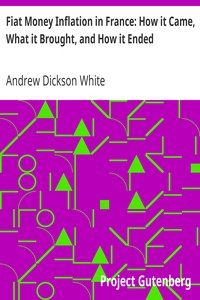Fiat Money Inflation in France: How it Came, What it Brought, and How it Ended
"Fiat Money Inflation in France: How it Came, What it Brought, and How it Ended" by Andrew Dickson White is a historical account written during the early 20th century. The book delves into the catastrophic impacts of the French government's experiments with fiat money during the Revolution, exploring the political and economic ramifications that stemmed from such a radical monetary policy. The opening of the work introduces White's extensive collection of documents
from the period just before the Civil War, which formed the backbone of his lectures on the topic of paper money inflation in France. He reflects on the growing demand for paper currency in France during the Revolution as the nation grappled with financial instability and heavy debt. Key figures such as Finance Minister Necker emerge as staunch opponents of inflationary policies, foreshadowing the discussions and debates that led to the ultimate decision to issue irredeemable paper currency. White emphasizes that the alluring yet misguided belief in paper money as a remedy for economic woes ultimately catalyzed significant devastation, foreshadowing the dire consequences that would follow. (This is an automatically generated summary.)
Read or download for free
| How to read | Url | Size | |||
|---|---|---|---|---|---|
| Read now! | https://www.gutenberg.org/ebooks/6949.html.images | 205 kB | |||
| EPUB3 (E-readers incl. Send-to-Kindle) | https://www.gutenberg.org/ebooks/6949.epub3.images | 176 kB | |||
| EPUB (older E-readers) | https://www.gutenberg.org/ebooks/6949.epub.images | 178 kB | |||
| EPUB (no images, older E-readers) | https://www.gutenberg.org/ebooks/6949.epub.noimages | 130 kB | |||
| Kindle | https://www.gutenberg.org/ebooks/6949.kf8.images | 428 kB | |||
| older Kindles | https://www.gutenberg.org/ebooks/6949.kindle.images | 416 kB | |||
| Plain Text UTF-8 | https://www.gutenberg.org/ebooks/6949.txt.utf-8 | 174 kB | |||
| Download HTML (zip) | https://www.gutenberg.org/cache/epub/6949/pg6949-h.zip | 174 kB | |||
| There may be more files related to this item. | |||||
Similar Books
About this eBook
| Author | White, Andrew Dickson, 1832-1918 |
|---|---|
| Title | Fiat Money Inflation in France: How it Came, What it Brought, and How it Ended |
| Credits | Produced by Gordon Keener, and David Widger |
| Reading Level | Reading ease score: 53.1 (10th to 12th grade). Somewhat difficult to read. |
| Language | English |
| LoC Class | HG: Social sciences: Finance |
| Subject | Assignats |
| Subject | Inflation (Finance) -- France -- History |
| Category | Text |
| EBook-No. | 6949 |
| Release Date | Nov 1, 2004 |
| Most Recently Updated | Mar 28, 2009 |
| Copyright Status | Public domain in the USA. |
| Downloads | 665 downloads in the last 30 days. |
| Project Gutenberg eBooks are always free! | |

